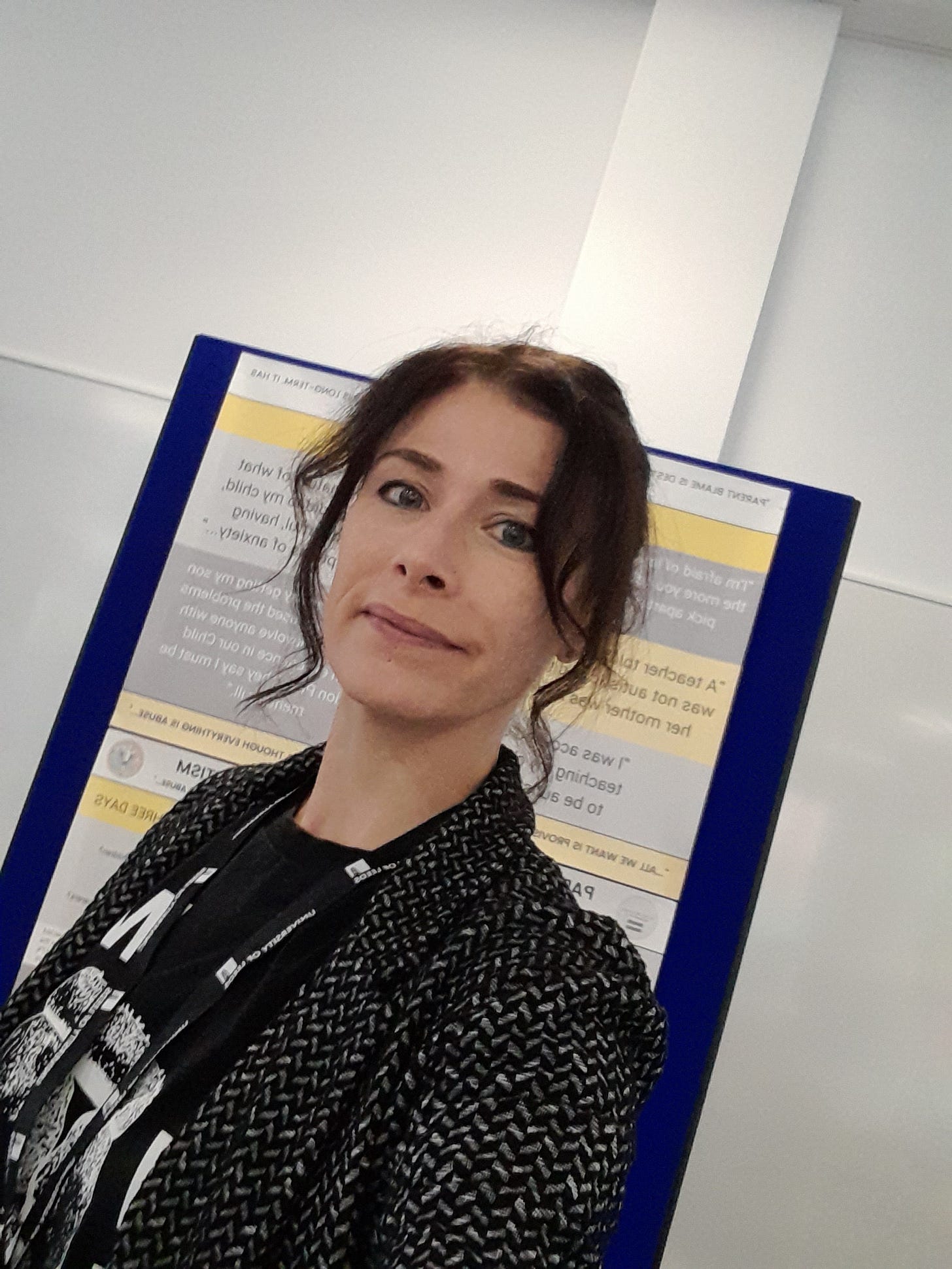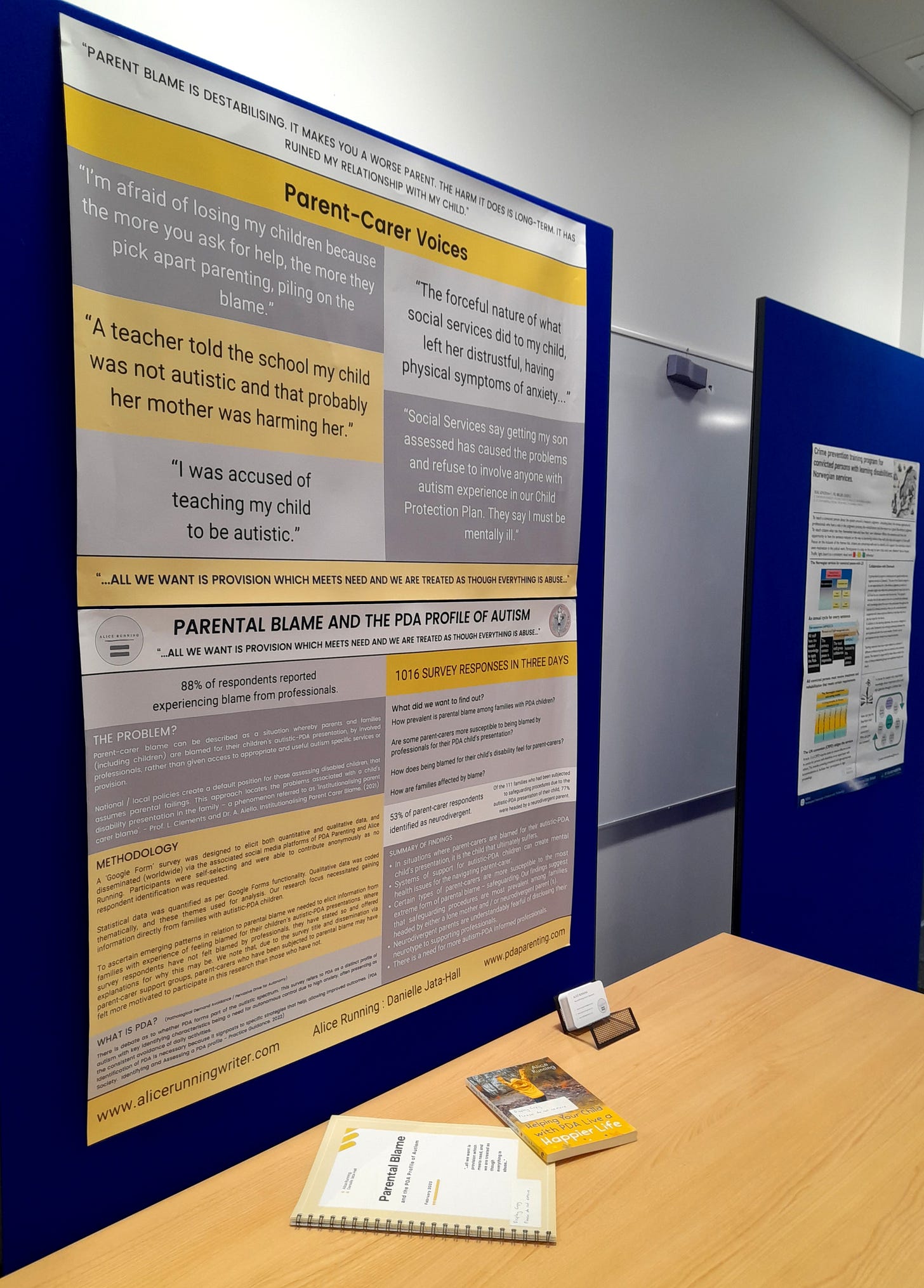Conference News / More Research Links / Westminster Debate
Campaign to Challenge Blame 2024
Hello readers, and thank you to all the new subscribers who have found their way here.
This is September’s round-up of information I hope will be useful in challenging (parent-carer) blame within autism (and associated) services.
Centre for Disability Studies Conference 2024 (CDS24)
At the beginning of September I was proud to display the findings from ‘Parental Blame and the PDA Profile of Autism’ at CDS24. The conference attracts disability activists and academics from around the world and so to secure a place to present our work was an achievement.
I met some lovely fellow attendees who were keen to share their personal experiences of navigating services for their children and the difficulties they encountered with having a PDA profile of autism sufficiently understood.
Presentations at the conference were many and varied, with autism and neurodivergence (more generally) being a central theme in three other poster presentations:
Autistic People’s Perspectives on Functioning Labels and Associated Reasons, and Community Connectedness. (Keates, N; Martin, F; Wadlock, K.)
A study of 516 participants with the aim of ascertaining the language preferences of autistic adults and how preference related to ‘Autistic Community Connectedness’.
The phrase ‘Autistic Person’ gained the most positive preference, with over 95% of participants agreeing that this phrase is ‘okay’. This phrase was closely followed by the terms ‘Autists’ or ‘Autistics’, with between 75% and 80% of participants in agreement that these phrases are ‘okay’.
The term ‘Aspergers’ was found to be the phrase which acquired the most ‘not okay’ votes with just over 60%, and closely followed by the phrase ‘Living with Autism’.
Language around autism (particularly language that is used to refer to autistic people) is important as some phraseology can be used by service professionals to denote ‘functioning’, thus assigning strengths or deficits and subsequently reducing identity and provision to perceived capability.
Exploring Belonging: The narratives of autistic people who attend(ed) Churches and Mosques. Wadlock, K.
Interviews with eight participants focused upon the experiences of autistic people within their religious spaces. Overall, Wadlock notes that participants experienced barriers to worship and found that the concept of being an ‘ideal worshipper’ is rooted within “an idealistic set of expectations and standards enshrined in normalcy” (Wadlock, 2024)
Identity, Employability, and Success: Why Tailored Employability Support is Important for Disabled and Neurodivergent Students to See Their Value and to Succeed After Graduating. (Bark, Lydia)
Bark proposes key issues for universities to consider when designing employability support for disabled and neurodivergent students, including:
considering how to address the needs and identities of students without assuming or imposing limitations, and
defining success in a way to ensure it is inclusive and accessible.
Bark writes that, “for disabled and neurodivergent students, success and employability might look different to their peers…success after graduating is therefore less about employment statistics and more about individuals having clear ideas about what they want and need from a workplace.” (Bark, 2024)
The Autism and Parental Blame Project - Focus Group Report - (focus-group-report-final-vs-adjust-2.pdf (wm-adass.org.uk))
This is a project commissioned by NHS England for which I have already shared a link to the associated Literature Review (which cites our study - Parental Blame and the PDA Profile of Autism).
“The Autism and Parental Blame Project was commissioned by NHS England in response to complaints from a number of parents who felt their child's autism had been missed, or misdiagnosed, because professionals involved in autism assessments had wrongly ascribed their child’s autistic presentation to poor parenting. The project has been facilitated by WM-ADASS with academic support provided by Dr. Jason Schaub from the University of Birmingham.”
The project has recently published a report of the focus group work undertaken and summarises the experiences of parents navigating services for their autistic children as:
“• Parents felt judged and accused of poor parenting when using strategies that worked best for their child. • Parents were often not listened to, felt dismissed, and not believed by professionals. ▪ Professionals were often quick to make assumptions based on little or no evidence or validation. ▪ Professionals failed to follow their own guidelines and polices. ▪ Professionals lacked training and understanding of autism and hidden disabilities and mistook this for trauma which in turn caused trauma. ▪ The multiple, devastating, and lasting impacts of parental blame, examples of child protection issues including Fabricated and Induced Illness, fractured relationships, and family breakdown. ▪ The need for parents to quickly become experts and skill themselves up to defend themselves. ▪ Parents felt that they needed to fight the system to get the basics for their child and to be heard as parents. ▪ Parents best experiences of services were when they were supported by a neurodivergent professional who just “gets it”.”
Autistic Looked After Children and Local Authority Awareness
I stumbled across this study undertaken in 2018. It makes for some interesting reading:
Awareness within local authorities of autism spectrum diagnoses of Looked-After children in England
Using Freedom of Information (FOI) requests to English Local Authorities, the researchers state that 3% of Looked After Children are autistic (and this ratio is likely much higher) compared with a 1 - 2% prevalence rate in the general population. (Why are there more autistic children in care?)
Returned data suggests that Local Authorities fail to strategically monitor autistic prevalence and associated need for their Looked After children.
Researchers point to poor academic outcomes for those autistic children in Local Authority Care when compared with academic outcomes for autistic children not in Local Authority Care.
Petition:
Thank you to a reader who sent me a link for this petition - it may be of interest to many of you:
(Note: this petition has not been created by myself)
Westminster ‘SEND’ Debate
Speaking at an emergency Westminster debate he secured, Leeds MP Richard Burgon highlighted the many and severe failures of the current #SEND system. Raising, among many other important issues, the use of parent-carer carer blame. He went on to highlight how failure to make provision for children constitutes state neglect. A position I wholeheartedly support.
I am sure many parent-carers will be concerned that 'talk' does not equate to 'action', nor negate the trauma many children and their care-givers have experienced whilst navigating this broken system. But to have secured such an important debate is progress and to have changemakers champion our voices is crucial to having barriers to education removed.
The full debate can be read here:
SEND Provision - Hansard - UK Parliament
And finally …
I received a message from a parent-carer via my website and was unable to reply due to contact details not being left. If you happen to read this - thank you!
It was suggested that there is a lack of post-blame support for parent-carers and the families surrounding and including our autistic children. We know that blaming parents for their children’s autistic presentations can cause harm to well-being, and that navigating the public services necessary to acquire assessment and provision can cause trauma. What we don’t have is a clear and identifiable pathway for support following such difficult and traumatic times.
I aim to extend the website - www.challengeblame.com - to include signposting information relating to post-blame support. If you are an independent professional, organisation or parent-carer who knows of any relevant service, please email me for inclusion at a later date.
Until October,
Alice X





